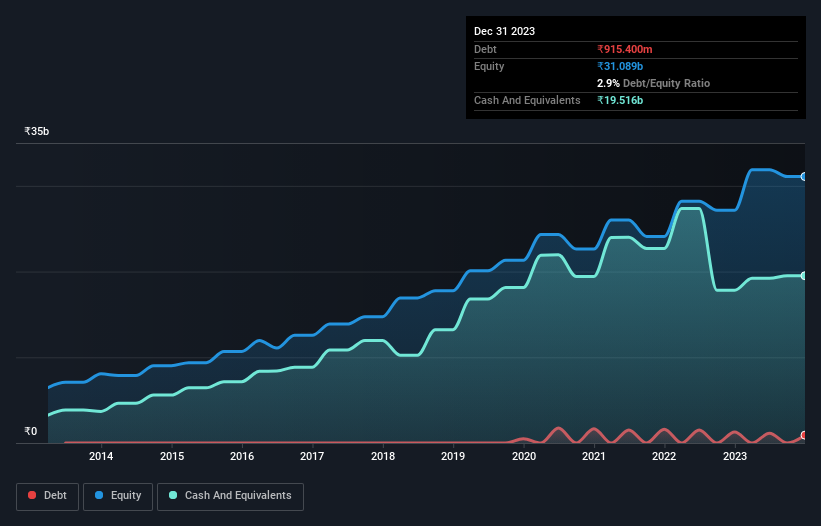
Warren Buffett famously said, 'Volatility is far from synonymous with risk.' When we think about how risky a company is, we always like to look at its use of debt, since debt overload can lead to ruin. We note that Abbott India Limited (NSE:ABBOTINDIA) does have debt on its balance sheet. But the real question is whether this debt is making the company risky.
What Risk Does Debt Bring?
Debt and other liabilities become risky for a business when it cannot easily fulfill those obligations, either with free cash flow or by raising capital at an attractive price. If things get really bad, the lenders can take control of the business. However, a more common (but still painful) scenario is that it has to raise new equity capital at a low price, thus permanently diluting shareholders. Of course, plenty of companies use debt to fund growth, without any negative consequences. When we think about a company's use of debt, we first look at cash and debt together.
View our latest analysis for Abbott India
What Is Abbott India's Debt?
As you can see below, Abbott India had ₹915.4m of debt at September 2023, down from ₹1.29b a year prior. However, its balance sheet shows it holds ₹19.5b in cash, so it actually has ₹18.6b net cash.

A Look At Abbott India's Liabilities
Zooming in on the latest balance sheet data, we can see that Abbott India had liabilities of ₹12.5b due within 12 months and liabilities of ₹1.60b due beyond that. On the other hand, it had cash of ₹19.5b and ₹3.78b worth of receivables due within a year. So it can boast ₹9.22b more liquid assets than total liabilities.
Having regard to Abbott India's size, it seems that its liquid assets are well balanced with its total liabilities. So it's very unlikely that the ₹613.6b company is short on cash, but still worth keeping an eye on the balance sheet. Succinctly put, Abbott India boasts net cash, so it's fair to say it does not have a heavy debt load!
Also good is that Abbott India grew its EBIT at 16% over the last year, further increasing its ability to manage debt. When analysing debt levels, the balance sheet is the obvious place to start. But it is future earnings, more than anything, that will determine Abbott India's ability to maintain a healthy balance sheet going forward. So if you want to see what the professionals think, you might find this free report on analyst profit forecasts to be interesting.
Finally, a company can only pay off debt with cold hard cash, not accounting profits. While Abbott India has net cash on its balance sheet, it's still worth taking a look at its ability to convert earnings before interest and tax (EBIT) to free cash flow, to help us understand how quickly it is building (or eroding) that cash balance. Over the last three years, Abbott India recorded free cash flow worth a fulsome 84% of its EBIT, which is stronger than we'd usually expect. That puts it in a very strong position to pay down debt.
Summing Up
While it is always sensible to investigate a company's debt, in this case Abbott India has ₹18.6b in net cash and a decent-looking balance sheet. And it impressed us with free cash flow of ₹12b, being 84% of its EBIT. So we don't think Abbott India's use of debt is risky. Above most other metrics, we think its important to track how fast earnings per share is growing, if at all. If you've also come to that realization, you're in luck, because today you can view this interactive graph of Abbott India's earnings per share history for free.
When all is said and done, sometimes its easier to focus on companies that don't even need debt. Readers can access a list of growth stocks with zero net debt 100% free, right now.
New: Manage All Your Stock Portfolios in One Place
We've created the ultimate portfolio companion for stock investors, and it's free.
• Connect an unlimited number of Portfolios and see your total in one currency
• Be alerted to new Warning Signs or Risks via email or mobile
• Track the Fair Value of your stocks
Have feedback on this article? Concerned about the content? Get in touch with us directly. Alternatively, email editorial-team (at) simplywallst.com.
This article by Simply Wall St is general in nature. We provide commentary based on historical data and analyst forecasts only using an unbiased methodology and our articles are not intended to be financial advice. It does not constitute a recommendation to buy or sell any stock, and does not take account of your objectives, or your financial situation. We aim to bring you long-term focused analysis driven by fundamental data. Note that our analysis may not factor in the latest price-sensitive company announcements or qualitative material. Simply Wall St has no position in any stocks mentioned.
About NSEI:ABBOTINDIA
Flawless balance sheet established dividend payer.
Similar Companies
Market Insights
Community Narratives




